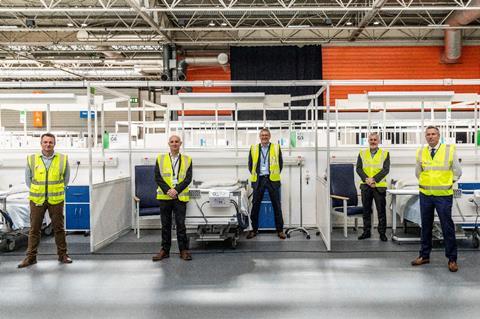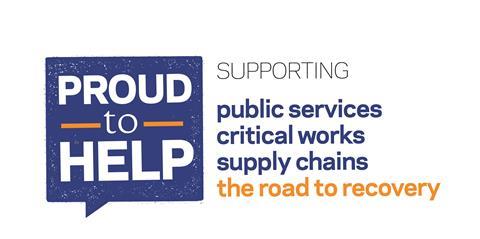A crisis triggered the need for the Nightingale hospitals but the mindset behind their construction should apply to all projects, in good times and bad
Last month the Joint Biosecurity Centre recommended that the covid-19 alert level should move from Level 4, defined as a covid-19 epidemic in general circulation where transmission is high, to Level 3 – where a covid-19 epidemic is in general circulation.

Throughout that transition the number of covid-19 patients who have stepped inside one of the seven new NHS Nightingale hospitals for treatment has been thankfully negligible. To an extent the NHS Nightingale Hospital Birmingham, which Interserve Construction delivered in just two weeks of frenzied activity during April, is all but redundant, pending a second wave.
That is a testament to the British public’s willingness to adopt the government’s rules and the fantastic service provided by the doctors and nurses of the NHS.
>> Building’s Proud to Help Campaign
However, it is worth reflecting on the lessons learned from the construction of the Nightingale hospital at the National Exhibition Centre.
Not least of which is that it is possible to continue working on construction projects even within the strictures demanded by a deadly virus. Interserve Construction has continued to work on its sites – many of them delivering covid-related projects – adopting the guidelines laid down by the Construction Leadership Council. The only sites we closed where those in London where it was impossible to socially distance on public transport.
New risk assessments and method statements developed to manage and overcome the restrictions in many instances detail a better way of working and those new methods will endure as we enter the “new normal”.
We learned we can deliver greater efficiencies in the supply chain from the manufacturers’ factory, through to the distributors and the subcontractors. Having a strong supply chain, both design team and subcontractors, was key in the successful delivery of the NEC Nightingale Hospital.
By laying plasterboard horizontally, rather than vertically, it is impossible to overstep the social distancing rule
In addition, necessity can be the mother of invention. The requirement to question how we build and why we build this way to overcome the social distancing issues created alternative solutions. One example of this was that by laying plasterboard horizontally, rather than vertically, it is impossible to overstep the social distancing rule.
The use of built off-site/pre-fabricated solutions, which should be a strong consideration on all our building sites, came to the fore as a key consideration and solution. Notwithstanding the efficiencies these solutions bring, they provide the added benefit of reducing the resource on site, aiding social distancing. Planning, partnership, and collaboration is key.
The use of digital technology on sites, even with something as simple as Microsoft Teams as an online alternative to face to face meetings has made us realise the efficiencies and benefits these technologies can provide. Furthermore, as an industry, we have been slow to adapt to the work from home approach.
Having been forced to do so, we have taken the use of these technologies into our homes, combining the workplace with working from home to the benefit of both our staff and the business. This ability to work productively outside the office will change the way we use our offices in the future.
Crucially, we also learned that in the future it is possible that customers, particularly those in the public sector, will procure construction services in a more agile and efficient manner.
The NHS selected Interserve Construction not just because of our experience of delivering world-class healthcare facilities but also because we could draw on the M&E experience of Interserve Engineering Services as well as key personnel like Vince Kesterton, the project director who led on the project.
Alongside this, we could demonstrate the support of a band of trusted subcontractors and our wider supply chain, including manufacturers.
This proves that clients can see there is an alternative to the way things have been done in the past and an efficient alternative clearly exists to progress a project when other factors are taken out of the equation.
It has shown how quickly decisions can be made when everyone is bought in early and are all reading from the same page
Procurement was not an issue with the Nightingale hospitals because of the provision of the government’s various frameworks allowing them to draw on a strong pool of talent. So, the client was making the decision based on value not cost. They want a team who can do the job quickly and to the highest quality. The value is that if this can be achieved, in the case of the Nightingale hospitals, then lives will be saved. There can be no better demonstration of value.
Pre-covid, the construction sector has had a few tough years. But during the coronavirus crisis we have been able to show what we can do as a sector. We should all learn from this lesson and explore the factors which make these projects possible.
Could it be like this all the time? With a shared purpose, collaboration and a focus on value, I think the best answer would be: probably, as long as we do not revert to the “but we’ve always done it this way” mentality which often defines our sector.
One of the key takeaways from our experience in delivering NEC Nightingale Hospital is that it has shown how quickly decisions can be made when everyone is bought in early and are all reading from the same page – prioritising the immediate requirements to the greater benefit of the end result.
Having witnessed the professionalism, agility and collaboration exhibited across the construction supply chain in the delivery of the Nightingale hospital in Birmingham, and elsewhere around the country, the NHS and other public service providers will have learned many positive lessons about what the construction sector can do when there is a clear sense of purpose and direction.
Meanwhile, on the back of the prime minister’s “Build, Build, Build” speech in Dudley last month, and his commitment of £5bn investment in the public infrastructure with £1.5bn for hospital buildings and over £1bn to fund a new, 10-year school rebuilding programme, plans for the delivery of a range of “shovel-ready” projects can be expedited quickly through the collaboration of the public sector, contractors and the wider supply chain.
After covid-19 and our sector’s response to support the NHS and other government departments our industry has been changed. For the better.
Simon Butler, Divisional Director, Interserve Construction
Proud to Help Award
The Building Awards have announced a new category to recognise the positive impact of vital construction work during the pandemic. Our Proud to Help Award builds on our campaign to shine a spotlight on all the work organisations and individuals have been doing through the covid-19 crisis to support the country’s public services, critical works and supply chains, as well as setting it back on the road to recovery. Submit your entry here.




























No comments yet